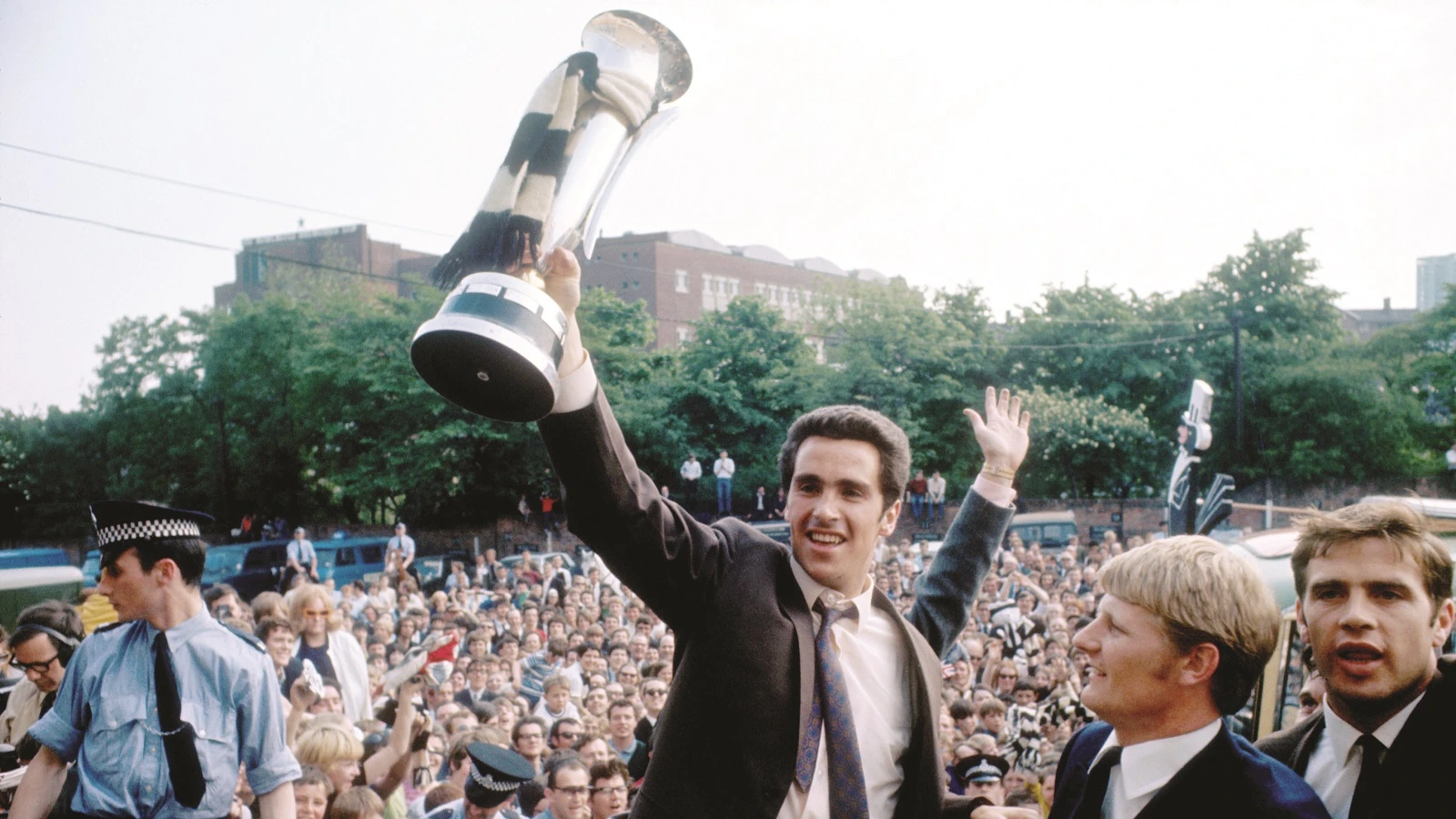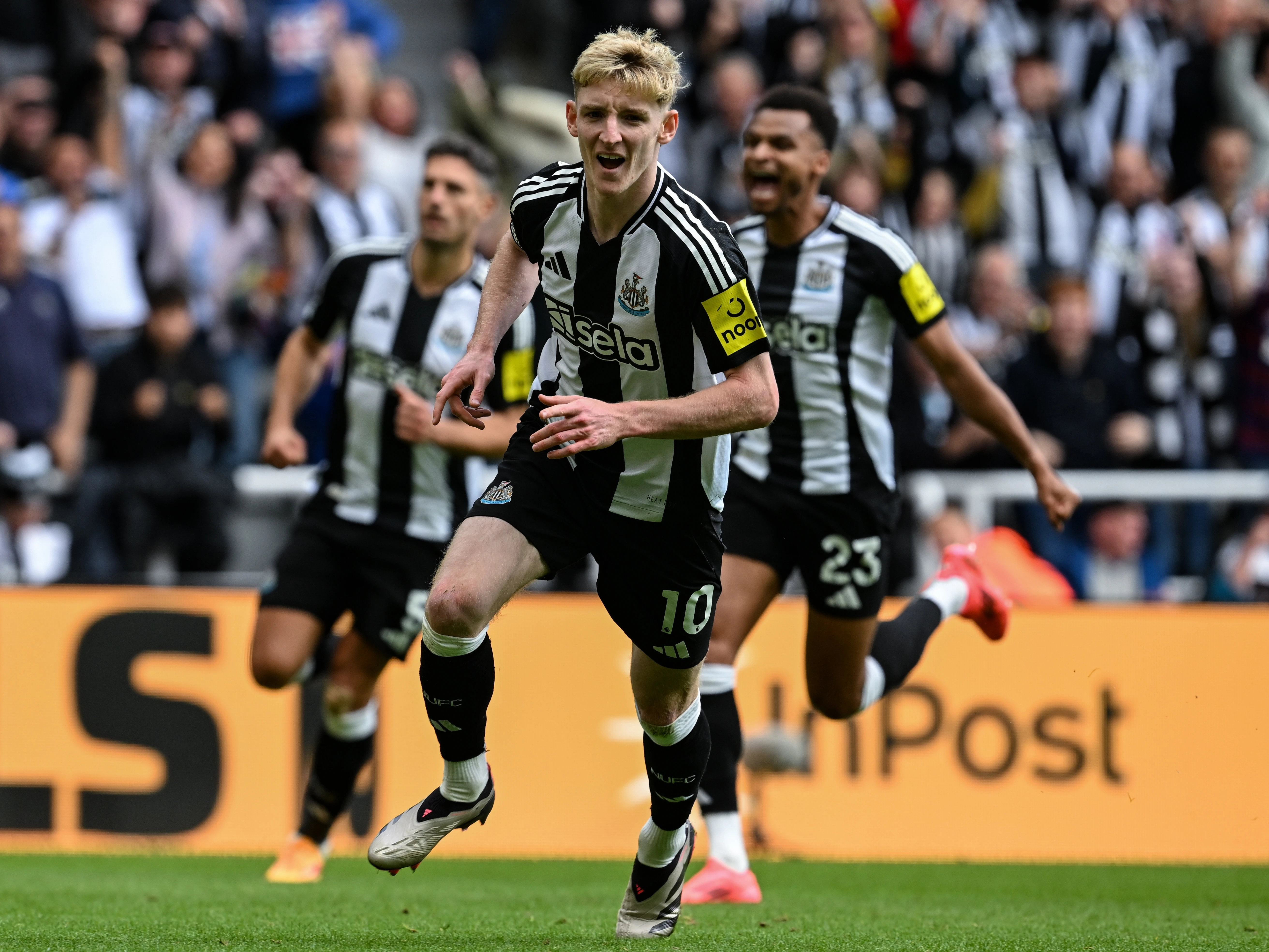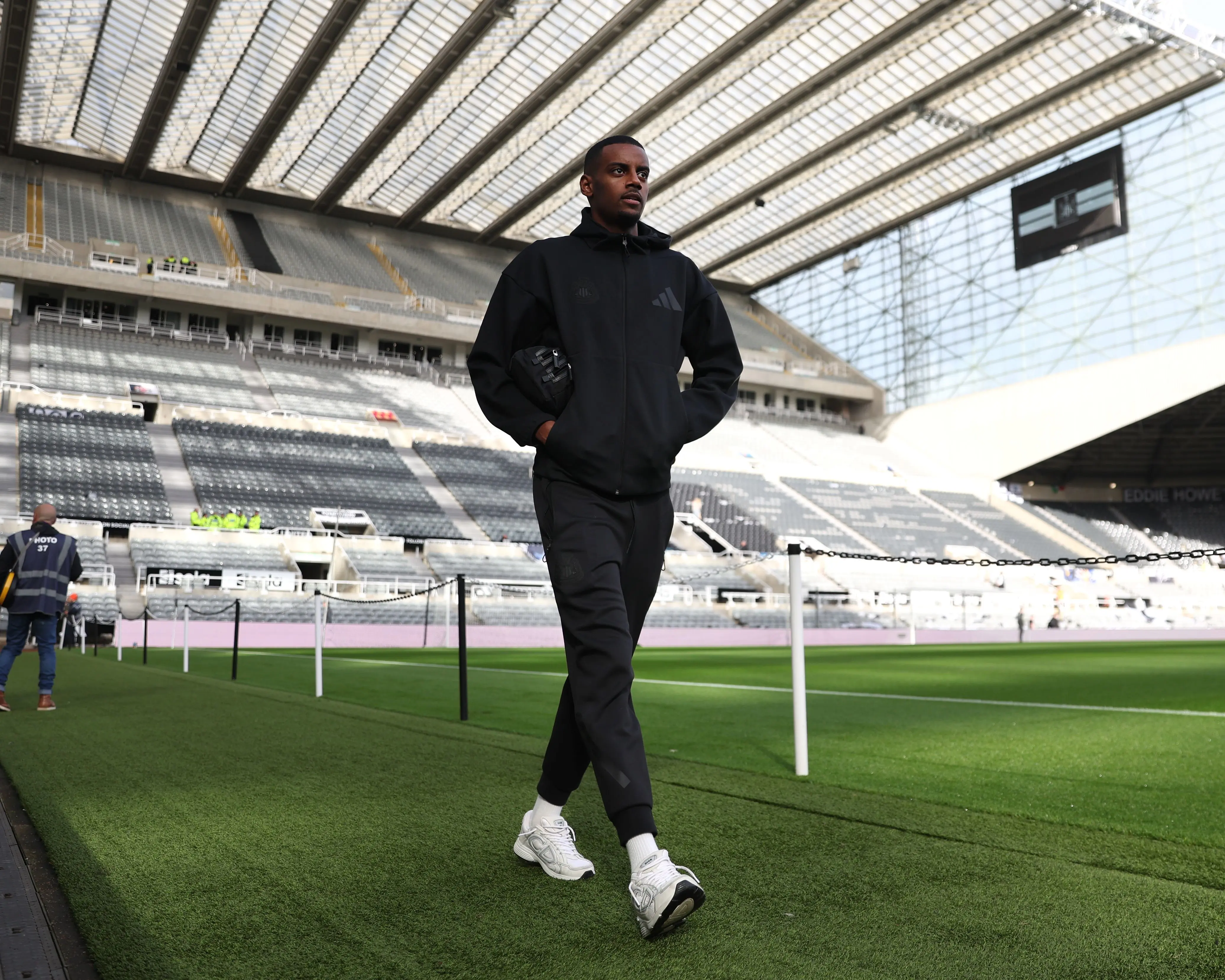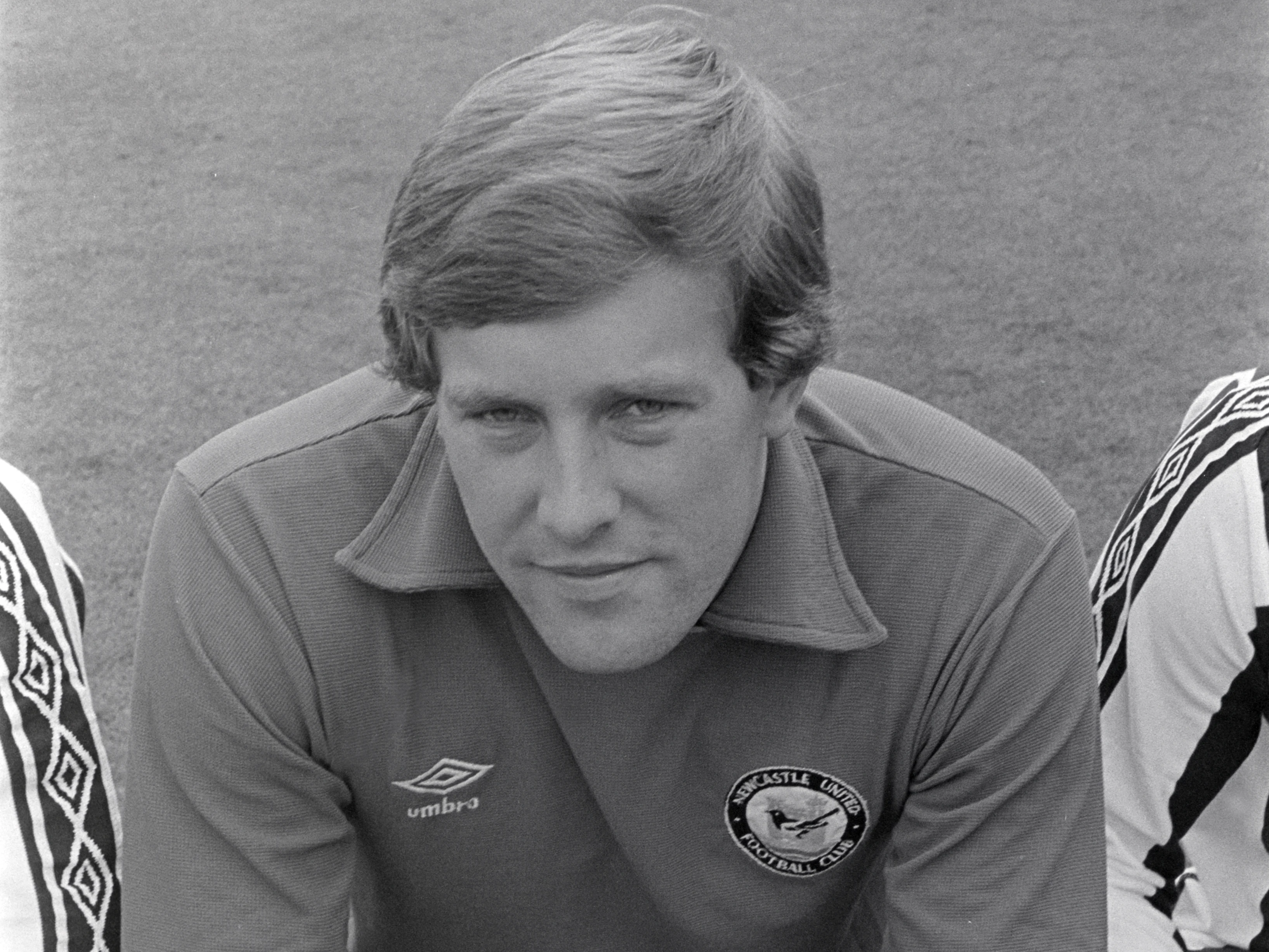Born in Perth, Scotland on 19th January 1945, Bob, a very likable Scot off the field, was a rugged and determined player on it. As a past Scotland schoolboy captain, he was raised in Perth then from nine years of age at Kirkliston near Edinburgh. After Bob had trials with Manchester United, Preston and Wolves, he began his career on Tyneside as a 15-year-old attacking half back or inside forward scoring in United’s FA Youth Cup victory over Wolves in 1962.
But the Scot struggled to claim a first-team place during his first five years with the club and almost departed for a small fee when 22-years old. Moncur, though, was determined to turn an average career into a great one and during season 1965/66, Bob began to concentrate on a central defender’s role. Soon he was to dominate the centre half position as the team’s key figure and was appointed club captain at the start of the 1967/68 season, having established himself as a regular first-teamer during United’s maiden season back in the top flight.
Bob, the Magpies’ most capped Scottish international player with 16 caps, missed United’s first two games in the Fairs Cup due to injury – the home and away ties against Feyenoord – but was an ever-present from then on, producing a number of wholehearted displays. His exceptional leadership qualities played a large part in seeing United through to the final – not to mention the two goals he scored in the first leg.
Bob also led United to the FA Cup Final in 1974 before ending his playing days at Roker Park, where he was manager Bob Stokoe’s skipper, leading Sunderland to promotion and totalling 101 games for the red and whites before moving into management. Following a spells in charge of Carlisle, Plymouth and Hearts, he returned ‘home’ to Tyneside where he still resides. His tale begins a few days before the second leg in Budapest.
“We were all on a massive high after the 3-0 home leg win over Újpest but it was my job, along with Joe (Harvey), to keep a lid on our emotions and make sure we prepared in the right professional manner. Yes, 3-0 was a great advantage to take to Hungary, but by no means was the job done.
“I’ve been asked countless times how someone who never scored a goal could get two in the first leg, and with my weaker foot. Well, I say cup finals bring out the best in people and it certainly did in me. It was really just a case of being in the right place at the right time, getting the run of the ball and a little bit of luck. Combine all those things, and with the footballing gods smiling down on you, anything is possible!
“There was two weeks between the two games so we’d been given a couple of days off by Joe but most of the time was spent training – just light sessions really, keeping us in shape for the second leg. We arrived in Budapest on Monday, two days before the game, and went straight to our hotel on Margaret Island which is situated in the middle of the River Danube, with access from bridges on either side. We had the district of Buda on one side and Pest on the other and we settled in straight away. We stayed at the Grand Hotel, on the north end of the Island, and I remember it being very secluded and peaceful, ideal really for us as opposed to being in a bustling, noisy city-centre location.
“You might have thought the nerves would be jangling a bit more given this was the final but I can honestly say I detected a very relaxed atmosphere rather than a nervy one – no different to when we’d been on our other European trips. Yes, it was a huge match and the biggest of our club careers, but there was definitely a sense of belief amongst the lads and a real feeling of ‘let’s get this job done’.
The matchday programme cover for the Fairs Cup final second leg
“We didn’t get up to much before the game, just training at the stadium as was the norm before European ties, and then just relaxing at the hotel which I thought was the best form of preparation – unlike in 1974 when we went down to London on the Monday before the FA Cup Final, a full five days before the match. I’m not saying that was why we got hammered in the final, but we got bored that week and it wasn’t part of our normal away day routine – maybe it showed in the match itself, who knows.
“Anyway, back to Budapest after getting that off my chest. Joe told us he was naming an unchanged team for the match and that was no surprise to anyone, why would you change a winning team of tried and trusted players who had just won the first leg 3-0?
“Funnily enough I remember our bus ride to the stadium like it was yesterday, just one of those things that sticks in your mind. Just half an hour or so, but the mood was one of concentrated excitement, kind of eagerly wanting kick-off to come around twinned with a deep inner determination to succeed.
“We knew full well that Újpest were better than the team we’d just thumped 3-0 two weeks ago and were in fact amongst the top five teams in the whole of Europe. Of that there was no doubt at all.
“Joe, bless him, could never be described as a deep-thinking tactical manager, but what he was was a man manager, and he made sure all his players were well looked after. You couldn’t buy that but Joe had it in abundance. He knew the game too and deep down I knew he was very wary of the Hungarians but at the same time confident that the group of lads he was managing could complete the job and bring the cup home.
“To the game, and they blitzed us in the first 45 minutes. Their movement and passing was of the highest quality and to be fair we hardly got a kick. Flair, imagination, pace and trickery, they threw the lot at us and the fact it took them half an hour to score their first goal owed more to luck on our part than anything else. They scored again just before the break and could have levelled the tie on aggregate had Willie (McFaul) not made a tremendous save. We had to dig deep to keep it at two so we could go in at half time and regroup.
“Although I didn’t play in Rotterdam in the first round, I was at the match supporting the lads and looking back now it was a bit of a similar situation. We were 4-0 up, supposedly cruising, but were then hit by two goals by the home side who looked like they could easily overturn the four-goal deficit in the second half. Feyenoord won the European Cup the following season in 1970 so it does illustrate what a good side they were. Anyway, the point was, we had turned a poor first half into a good second half already in the competition so there was no reason, calling upon that experience, why we couldn’t do it once again.
“And now of course we come to Joe’s famous half time words in a story told a thousand times. There we were sat in the changing room, sweat pouring off our faces, some of us with heads bowed, some not knowing what had hit us, and some with their heads in a whirl. In one of the most iconic lines ever given by a manager, and using his unique motivational skills – remember this was from a man who had won the FA Cup twice in 1951 and 1952 and been a winning coach on a third occasion in 1955 – he simply looked around the room, caught everyone’s attention, paused, before uttering the immortal words: ‘lads, all you need to do is score and they will collapse like a pack of cards, you mark my words.’ And that was it, and off he went leaving us to all digest what he had just said. There was nothing else, no tactical changes or telling individual players to do this and that, just the Joe Harvey way of doing things. And to this day I’m still not sure if all the lads believed him or whether they thought he was mad!
“As captain I drummed that message into the lads as we took to the pitch again, score I said to them all and we can turn this game around. Újpest I remember came back out looking extremely confident, and why not, but we knew the early stages of the second half would be pivotal in the grand scheme of things.
“And then the miracle of Budapest began – there was a miracle of Istanbul in 2005, but this one came first! Three minutes in Jackie Sinclair put over a cross and I just happened to be on hand to hook it goalwards and past Szentimihalyi into the net. That visibly stunned them and when Benny (Arentoft) smashed in a volley less than five minutes later, we knew the cup was ours. Incredibly Joe’s words had been spot on and the icing on the cake was delivered when Alan (Foggon), who’d just come on as a sub minutes earlier, raced through the middle and when he hit the bar, he was the first to get to the rebound and score from point blank range.
Alan Foggon nets United's third goal of the game
“The last 15 minutes or so just passed us by, the game was over, we knew it, they knew it, and the intensity levels just dropped as we could just enjoy the feeling of knowing we’d won the cup. It was the best feeling in the world when the final whistle went, joy amongst the players was unconfined and our achievement of winning the cup, in our first ever season of European football, slowing began sinking in although it wasn’t until we got home and after the celebrations that the enormity of it all hit me.
“Sir Stanley Rous, the English-born hugely respected football administrator who at the time was the President of FIFA, presented me with the trophy and I remember well his words of congratulation to me. He was neutral of course but admitted to me how pleased he was to be handing the trophy over to an English club, but albeit to a Scotsman! The presentation ceremony was nothing like the staged occasions they have today with platforms, music and pyrotechnics, just a simple handover of the trophy and that was it. We then went on a lap of honour, parading the cup as we went, and to be fair the Újpest supporters were very magnanimous in their appreciation of our success despite the bitter disappointment they must have been feeling. We all got a miniature Fairs Cup trophy as our medals and I ended up getting a pile of them on a tray and handing them out to the lads, quite bizarre really.
“There were quite a few journalists who had accompanied us on the European trips, and in the earlier rounds they’d even gone out a few days before us, or even a week before, to check out the opposition. Anyway, for the Újpest game they were all there in force and watching from the press area, except for one, the very well-respected Bob Cass who sadly is no longer with us. Bob had arrived late at the stadium for some reason and couldn’t get access to the press area but fortuitously he got in to the ground through the players entrance just before kick-off whereby Joe just told him to sit on the end of the team bench. So, remarkably, he filed his report from the touch line – how incredible is that!
Sir Stanley Rous (right) presents Bob Moncur with the Fairs Cup trophy
“And so that was it, well as far as the football was concerned. Champagne arrived from somewhere, I don’t know where, and I vividly remember the lads taking it in turns to drink it out of the cup. As a tight knit group of players we were really delighted for each other and it showed as we departed the stadium to return to the Grand Hotel for a celebratory meal that the club directors had organised. I’m not sure if we’d have done so had we lost but it was a great gesture from them. The next morning, after a really fabulous night, and a very late one, we took the cup down to the banks of the Danube for a photograph before heading to the airport and home.”
Bob, along with former club colleagues Alan Foggon, John Craggs and Keith Dyson recently returned to the scene of their triumph, courtesy of an invitation from the Újpest club, and commented upon returning: “I had an immensely enjoyable career but this achievement, winning the Fairs Cup and lifting the trophy as captain, was undoubtedly my finest moment in a black and white shirt. And that’s why being able to return to the scene of that triumph fifty years on was so extra special, not just for me but for Alan, Keith and John too.
“I must say a massive thank you to the management and players of Újpest for not only inviting us across to Budapest, but for their magnificent hospitality and genuinely warm welcome. They were the perfect hosts at all times and considering we beat them, I consider them to be true sportsmen in that regard.
“So that’s it, a truly wonderful occasion, 50 years on – but like many others, I’d gladly consign all of that to history if it means the current Newcastle United can win a major trophy in the not too distant future.”
The line-ups
Újpesti Dózsa: Antal Szentimihalyi, Beno Kaposzta, Istvan Bankuti, Ede Dunai, Erno Solymosi, Erno Nosko, Laszlo Fazekas, Antal Dunai, Ferenc Bene, Janos Gorocs, Sandor Zambo
Manager: Lajos Baroti
Scorers: Ferenc Bene (30), Janos Gorocs (42)
Newcastle United: Willie McFaul; David Craig, Frank Clark; Tommy Gibb, Ollie Burton, Bob Moncur; Ben Arentoft, Bryan Robson, Wyn Davies, Jim Scott (Alan Foggon 73), Jackie Sinclair.
Manager: Joe Harvey
Scorers: Bob Moncur (48), Ben Arentoft (52), Alan Foggon (74)
Venue: Megyeri uti Stadion, Budapest
Attendance: 34,000
1968/69 Fairs Cup statistics
Appearances
12: Frank Clark, Wyn Davies, Tommy Gibb, Willie McFaul, Bryan Robson, Jimmy Scott
11: Ollie Burton
10: Bob Moncur
9: David Craig
8: Alan Foggon
6: Jackie Sinclair
4: Ben Arentoft, Keith Dyson, Dave Elliott, John McNamee
3: John Craggs, Keith Dyson
2: Geoff Allen
1: Albert Bennett, Ron Guthrie, Arthur Horsfield, Jim Iley, Graham Winstanley
Goals
6: Bryan Robson
4: Wyn Davies, Jimmy Scott
3: Tommy Gibb, Bob Moncur
2: Alan Foggon
1: Ben Arentoft, Jackie Sinclair
Manager Joe Harvey with the Fairs Cup trophy




